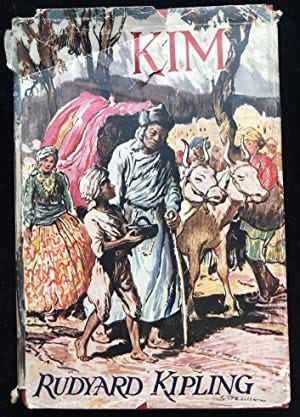Great Game (1837-1907)
The Khyber Pass especially-Read _Kim_ as background for Afghanistan
Afghanistan was viewed as a buffer state during the “Great Game” (1837-1901) between the Russian and British Empires.1
The novel, Kim, (story of Kimball O’Hara) by Rudyard Kipling (1901), was set during the Second Anglo-Afghan War between the British Raj and the Emirate of Afghanistan.2
The brief trailer from the 1950 movie, Kim, based on the novel, demonstrates how little the West understood India and Afghanistan. (see below).
Kipling’s use of the term, “great game,” became common parlance for the rivalry. It became even more popular after the 1979 Soviet–Afghan War.3
Seeing Afghanistan through the eyes of British India (Kim, novel, 1901) and the post World War II film industry (Kim, film, 1950) causes me to reflect today that the West has never understood Afghanistan.
The "Great Game" was the complex rivalry—characterized by wars, assassinations, and espionage conspiracies—between Britain and Russia for control of Central Asia and the Near East. It foreshadowed the Cold War. The Soviet Union\'s incursion into Afghanistan in 1979 prompted the United States to support the Mujahedin throughout the 1980s. See: Hopkirk, Peter. The Great Game : the Struggle for Empire in Central Asia . New York: Kodansha International, 1992.
Hopkirk, Peter. Quest for Kim : in Search of Kipling’s Great Game . Ann Arbor: University of Michigan Press, 1997.
Seymour Becker, "The ‘great game’: The history of an evocative phrase." Asian Affairs 43.1 (2012): 61-80.



We got several things badly wrong from day one.
1. There is no Afghanistan. There is a collection of tribes united by religion and language and nothing else. The Afghans are tribal, with loyalty to tribe first, and no loyalty to any other group. The tribes have been in conflict with one another for several thousand years. Tribes are kinship-based. No external force has ever been able to change this. We are being driven to become a tribal country based on skin color and similar irrelevant attributes.
2. The religion and the government are one and the same. Islam is indeed a religion of peace; just as Christianity was used to promote the KKK, so, too, is Islam used to promote the tribal view of women as property. Putting effort into establishing women's rights is wasted; they can have no sustainable rights until the country becomes a nation, and literacy exceeds 50%.
3. The geography itself supports a tribal culture. We know this happens in Andean countries; why are we surprised that rugged mountainous terrain promotes isolation? In Colombia, I learned that the mountain-enforced isolation led to development of multiple mutually-incomprehensible dialects of Spanish. I'm astounded that standard Pushtu is understandable throughout Afghanistan, although I did discover that use of Castillian Spanish - Spain's version of the Queen's English - let me be understood everywhere. I still couldn't understand many of the responses.
I think I will reread Kim. I wish we could get some of those older books back into the schools so that Americans would not grow up with such an isolated American view of the world. So many of us have no idea about the long history of international relations and how we have to pay attention to the history of places we get involved with. This is a sad day for us.